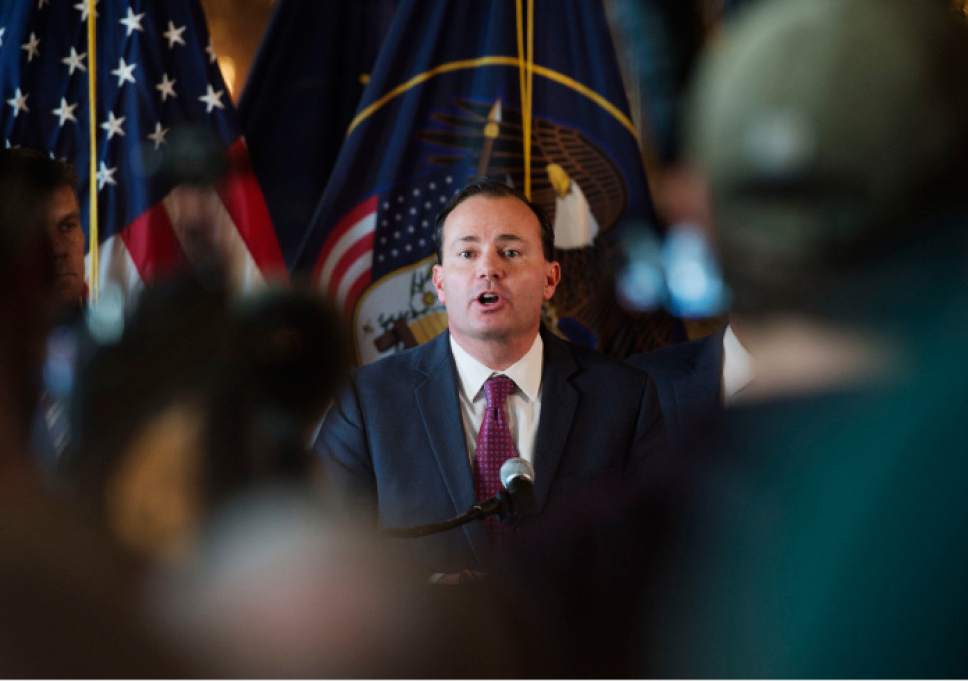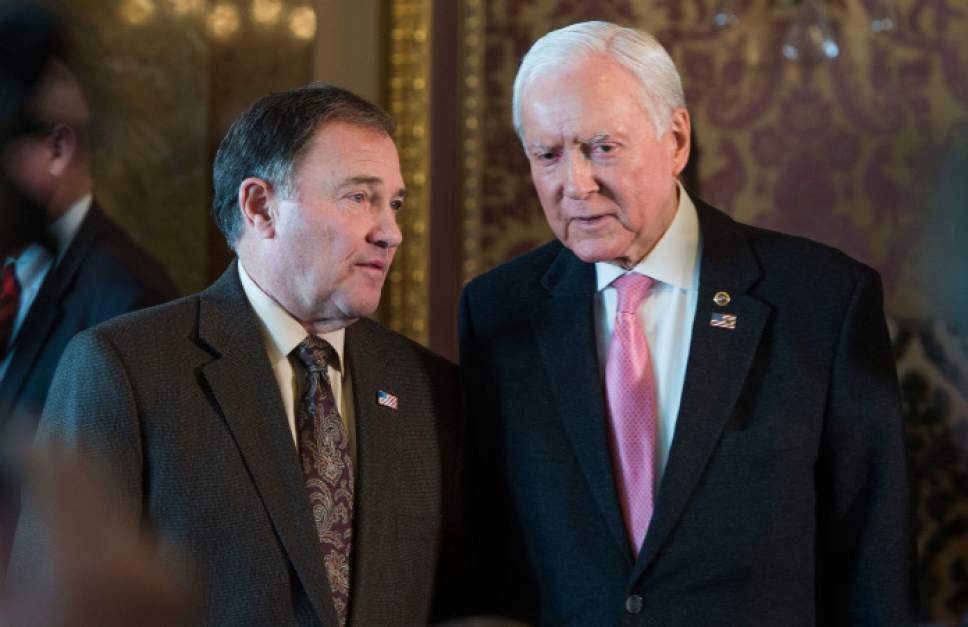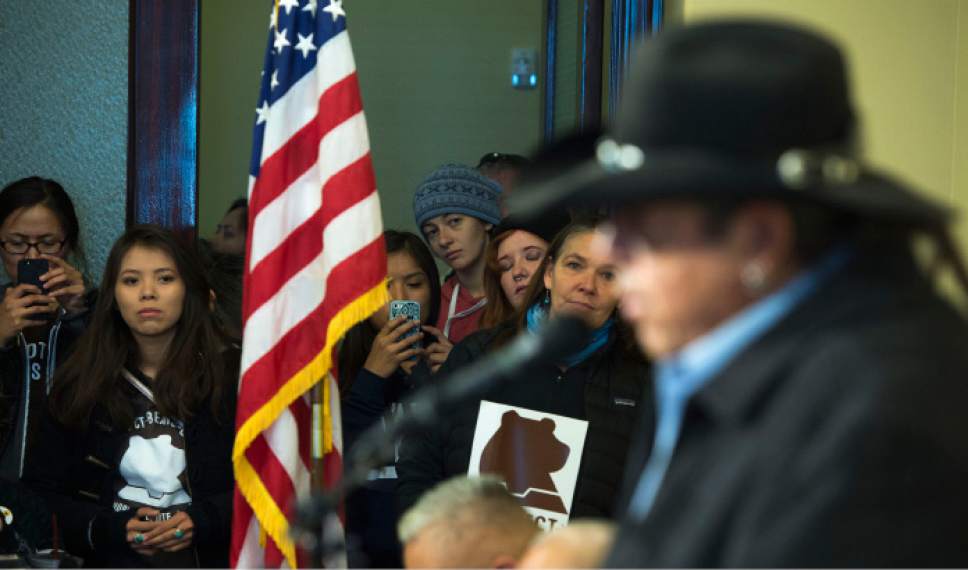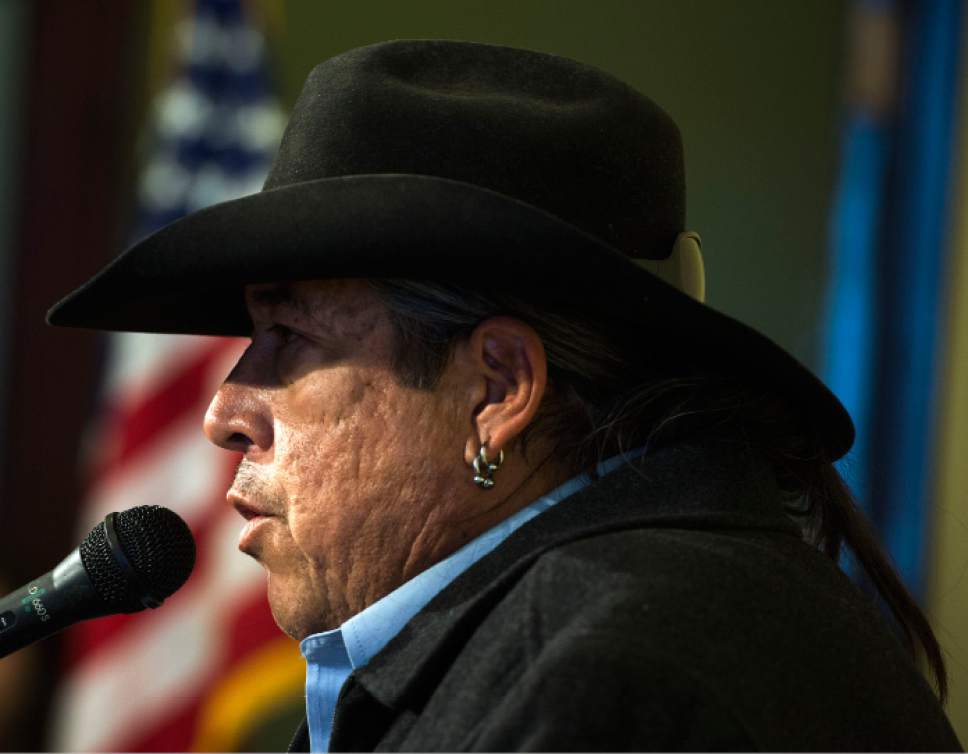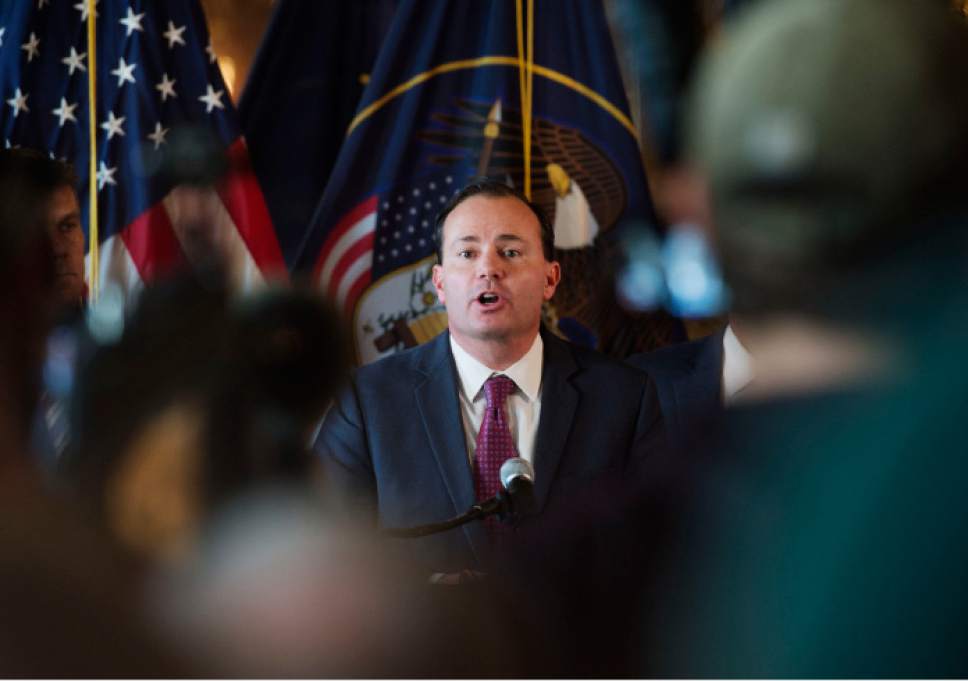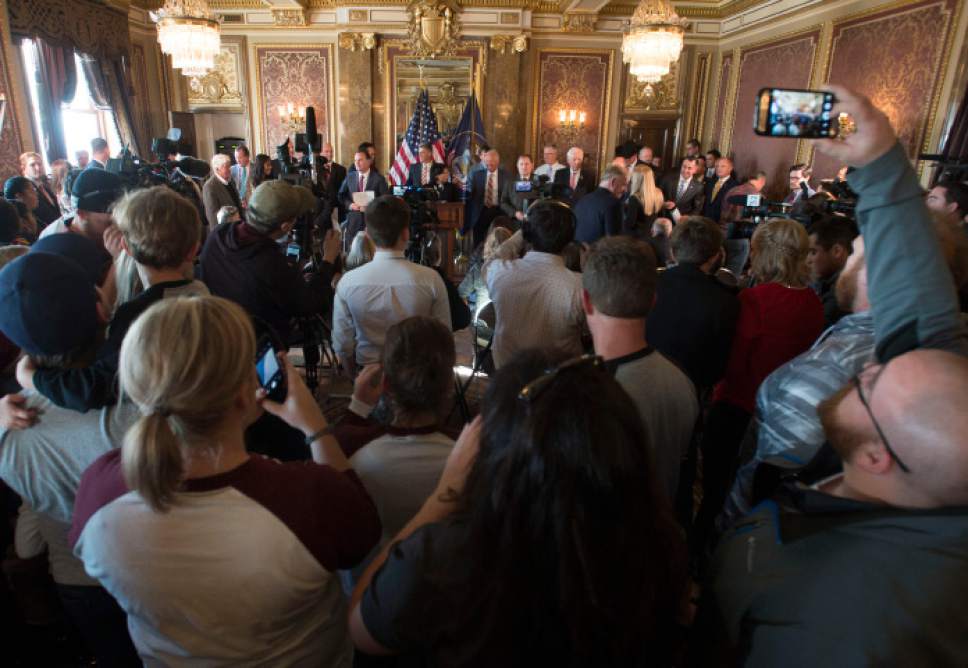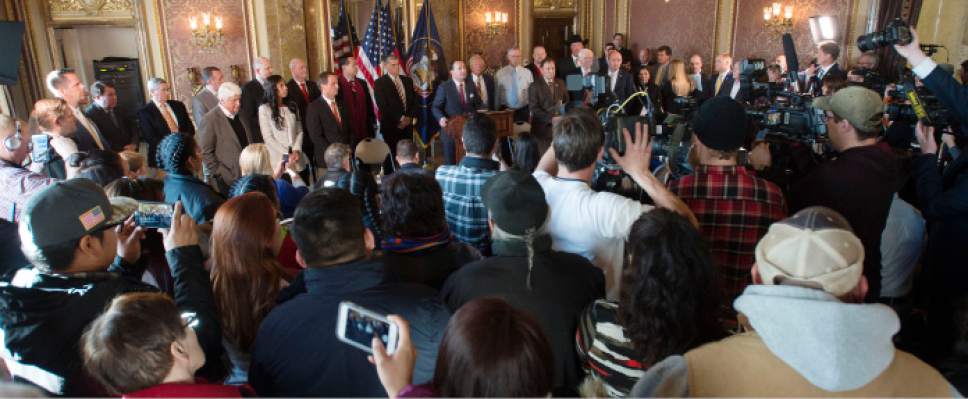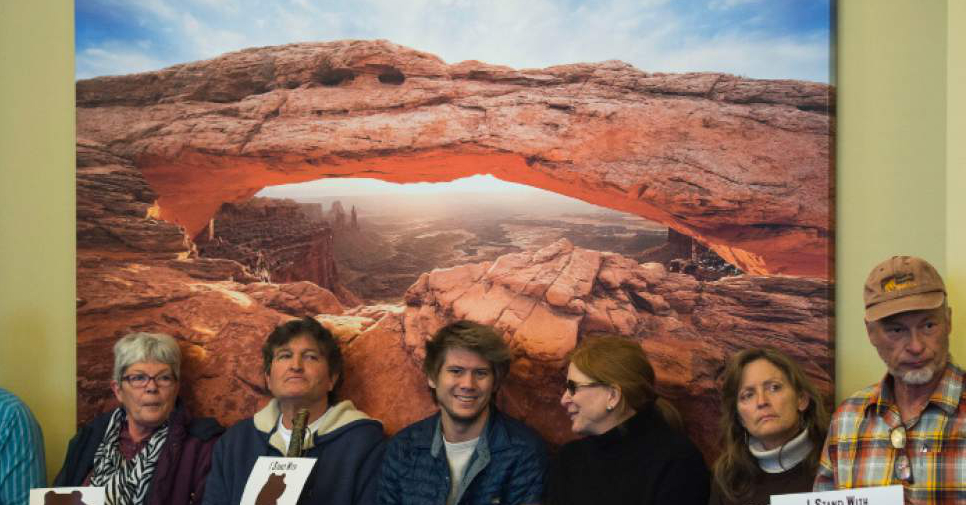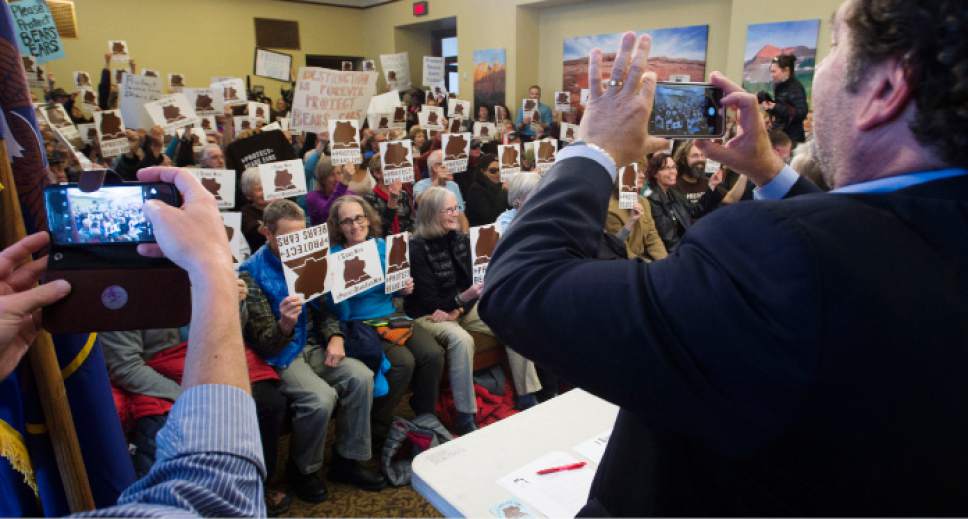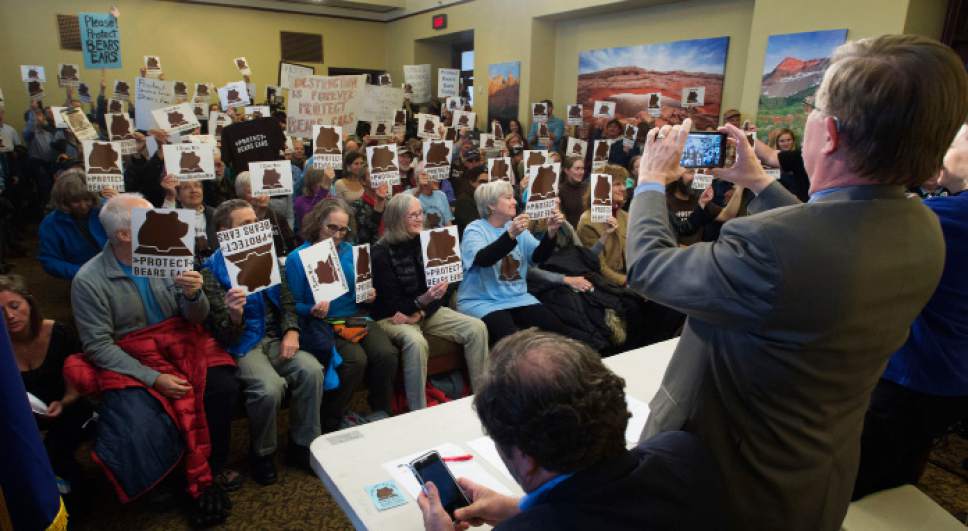This is an archived article that was published on sltrib.com in 2016, and information in the article may be outdated. It is provided only for personal research purposes and may not be reprinted.
Presenting a united front against an anticipated national monument designation, Utah's top political leaders and several state and local elected officials rallied Monday afternoon at the Capitol in Salt Lake City, demanding that outgoing President Barack Obama refrain from "unilaterally" setting aside the Bears Ears region.
Led by Sen. Mike Lee, they argued such an "abuse" of executive power, authorized under the 1906 Antiquities Act, offends the principles of American democracy and would be a slap in the face of San Juan County residents.
A "midnight monument" proclamation, they said, could do more to harm this landscape, which includes the public lands surrounding Bears Ears Buttes west of Blanding, than protect it, they say.
Utah's congressional delegation, Gov. Gary Herbert and Attorney General Sean Reyes pledged to use "every tool in our arsenal" to undo a monument. They agreed Bears Ears is a special place worthy of protection, but say that is best achieved through a legislative process.
"We are committed to doing that, but there is a right way and wrong way, and this is the wrong way," said Rep. Chris Stewart. "Mr. President, if you care about the Antiquities Act, don't do this. If you abuse the Antiquities Act, Congress is going to take that power away from future presidents. ... If you care about trust between the American people and Washington, D.C., then don't do this because by doing this you will break down that trust ... there are so many people who look at the big heavy hand of the federal government and recognize that many times they don't care about people in the West and don't care about people in Utah."
Sen. Orrin Hatch announced he intends to introduce legislation that would exempt Utah from Antiquities Act designations, and Reyes promised to file a lawsuit.
Crashing Monday's Capitol event were at least 150 monument supporters, led by three elected tribal representatives who speak for the Navajo and Ute nations, which — along with the Hopi and Zuni — have formally petitioned the president to protect 1.9 million acres as a national monument.
Addressing an overflow crowd in a downstairs meeting room, Davis Filfred said he saw a good omen in the Chicago Cubs' World Series recent victory after a century of heartache.
"I'm here to say, take out your pen and sign the Antiquities Act. This is the year of the bears. It was the Cubs that won the Series, and now the Bear is going to be a national monument," said Filfred, who serves on the Navajo Nation Council representing several Utah chapter houses. "I told Secretary [Sally] Jewell, 'President Obama needs to be brave. This land should be protected. It is beyond due.' Our culture, our heritage, our language, everything is there within the cliff dwellings."
Joining Filfred in support of a monument were Malcolm Lehi, a White Mesa cattleman who served on the Ute Mountain Ute council; and Shaun Chapoose, council chairman of Ute Indian Tribe. The monument proposal they champion calls for leaving the land open for rituals, gathering herbs and wood, and other traditional practices — the very things San Juan County Commissioner Rebecca Benally says would be foreclosed should a monument be declared.
Benally hails from the same Aneth chapter as Filfred, but has an opposite view on the monument, which she likens to a government "land grab" that would lock out Native Americans and undermine their way of life and economic development in one of the most impoverished corners of the West.
The most prominent Navajo opposed to the monument, Benally opened and closed Lee's gathering in the Capitol's elegant Gold Room. She called on environmental groups to quit "romanticizing and using Native Americans" for their political ends and decried the monument proposal for dividing tribal communities and tearing families apart.
Benally has argued a monument would be a "devastation" thrust on Utah's Native Americans, but Filfred believes actual devastation is what could await Cedar Mesa and its maze of canyons and buttes if Obama fails to proclaim a monument. He pointed to the contamination left by oil and gas development in his hometown, several miles to the east of Bears Ears.
"To me, that means leveling it into a parking lot, going after the oil, uranium and potash between the Ears. I want wilderness. I don't want my land torn up. There is sacredness everywhere, every plant, every rock," Filfred said.
Joining Lee and his congressional colleagues in the Gold Room were all three members of the San Juan County Commission and the two state lawmakers who represent this area, Sen. David Hinkins and Rep. Mike Noel, as well as top legislative leaders. Chaffetz was the sole member of Utah's congressional delegation not at Monday's event, due to a scheduling conflict.
At numerous press events and meetings with top federal officials, Herbert has implored the president to give Congress a chance to act on the Public Lands Initiative, or PLI, Reps. Rob Bishop and Jason Chaffetz's ambitious bill that identifies which lands in eastern Utah are to be preserved and which are to be open for development. The bill envisions national conservation areas and wilderness designations for the Bears Ears region.
But conservationists say the governor's events only highlight Bishop's shortcomings as a legislator.
Obama has waited to act on Bears Ears until the waning moments of his tenure to give the Utah congressman, who chairs the House Natural Resources Committee, every chance to get his sweeping lands bill passed, argued Democratic lawmakers at the tribe leaders' press event. The House adjourned earlier this month without taking a vote on the PLI.
"Our representatives, despite their claim to be conservatives, are not that interested in conserving Bears Ears. Let's do that for them," said Rep. Brian King, D-Salt Lake City.
If anything, the Bears Ears saga has exposed a deepening rift between Utah's congressional delegation and tribal leadership. The Ute Indian Tribe is so incensed with the land swaps proposed in the PLI that it has created a political action committee aimed at unseating Bishop, whose district includes the Utes' reservation.
Navajo president Russell Begaye has designated Filfred to speak for Utah Navajo, yet Chaffetz has never sought his views or even bothered to meet him, Filfred said.
Chapoose said the Bears Ears controversy could have been avoided had congressmen sat down with the tribes to get their input and crafted a bill that incorporated the tribes' wishes.
"It might have not have been the conversation they wanted. It would have been honest. It would have truthful. Indian Country has been here longer than this state has," Chapoose said. "Here we sit at a junction with an opportunity for all the citizens of Utah to have a conversation and figure how best to manage our resources. Here sits us, the oldest residents of Utah, in the backseat watching."
Upstairs, Utah's Republican leaders laid out their case against a monument and pledged to fight it. Noel said the Antiquities Act was passed in 1906 to safeguard small areas harboring antiquities that were under imminent threat. Since then, numerous environmental-protection statutes have been enacted to render big monument designations unnecessary.
"There are more than enough laws and regulations in place to protect every single artifact in San Juan County, including the Bears Ears. That can be done," said Noel, a Kanab rancher who is among the most vocal critics of federal land management and a proponent of transferring public land to the states. He likened Obama's anticipated action to the much-maligned surprise designation of the Grand Staircase-Escalante National Monument by former President Bill Clinton in 1996.
"This will be tested in the Supreme Court, I promise you, and it will reversed," he said. "There's no question about it. Those groups and their sponsors that lock this land up and continue to take away the rights of local citizens and rights of the sovereign state of Utah, you will lose this right to use the Antiquities Act. You have overreached."
Reyes said his office is preparing a lawsuit that would challenge a Bears Ears designation. He declined to give the specifics since he hasn't seen the proclamation Obama would issue.
In the 110-year history of the Antiquities Act, no presidentially proclaimed monument has ever been overturned by the courts, and it was from no lack of trying. Suits date back to 1908 when Arizona challenged President Theodore Roosevelt's designation of Grand Canyon National Monument. That monument later became one of the National Park Service's crown jewels.
Speakers blasted Obama's designation of 23 new national monuments during his tenure. Some are small historical locations or large expanses of ocean, but about half are landscape-scale designations in Western states, totaling 4 million acres.
Lee acknowledged that Utahns are divided over Bears Ears, adding "we in our state know how to unite. Mr. President, know this. You might choose to exert your authority to designate this monument on your way out the door, but please know if you choose to do so, not only will you be harming the people of San Juan County, who overwhelming oppose this, you will be tarnishing the Christmas season, you will be tarnishing your own legacy, and you'll be sowing the seeds for the destruction of the thing you seek to create right now because we will every use every tool in our arsenal to undo what you are doing by working with the new Congress and the new president."
Brian Maffly covers public lands for The Salt Lake Tribune. Brian Maffly can be reached at bmaffly@sltrib.com or 801-257-8713. Twitter: @brianmaffly


